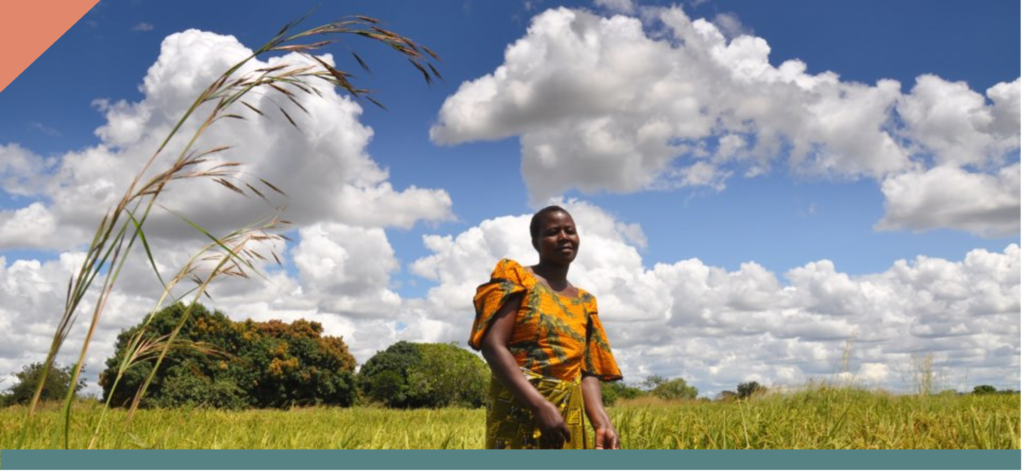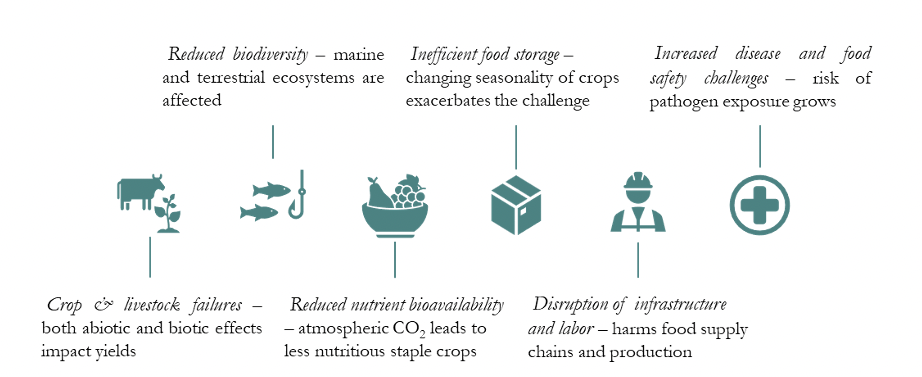Challenges and Opportunities for Children’s Health in Sub-Saharan Africa
Executive Summary: click here for full report

Through qualitative research, we identify three primary challenges impacting agricultural food systems and nutrition in Sub-Saharan Africa, all of which are further exacerbated by climate change:
Population and urban growth: By 2030, Africa’s population is expected to increase by 42% over its 2015 population and the population in Sub-Saharan Africa will have doubled by 2050
Strained food systems: Sub-Saharan Africa’s continued malnutrition challenge is driven in part by food systems which cannot meet the needs of its populations
Income inequality: Some of the highest GDP countries in Sub-Saharan Africa, also have the highest prevalence of income inequality.
Climate change, through conditions of acute weather events and slow-onset effects, produces the following direct effects:

Societal implications follow from the direct effects of climate change conditions:

The coalescence of societal implications, direct effects, and climate change conditions—exacerbated by food systems—impacts nutrition:
Access to nutritious food: By 2050, climate change will result in additional price increases of 5-25% for the most important agricultural crops
Utilization of nutritious food: More prevalent infectious diseases and worse water quality reduces the capacity to utilize nutritious food.
Availability of nutritious food: Reduction in food system productivity due to climate change limits the availability of nutritious food
Access to nutritious food: By 2050, climate change will result in additional price increases of 5-25% for the most important agricultural crops

We identify key insights about the challenges posed by climate change and food systems in Sub-Saharan Africa:
The nexus between climate change, food systems, and nutrition is not adequately recognized and resourced
Impactful action requires extensive, catalytic collaboration and commitment by a vast collection of sectors and stakeholders
Effective interventions will require forward-thinking policies and supportive government structures
Food system solutions require innovative technologies and abundant capital investments which are tailored to the African context
Synthesizing the challenges surfaced in the report, we identify seven opportunities for impact:
- Coalition Building: International Climate, Food Systems, Nutrition Collaboration and Advocacy
- Impact Investment: Convergence of Climate, Food Systems & Nutrition
- National Food Systems Support: Efficiency and Resilience
- Decreasing Impact of Reduced Nutrient Bioavailability
- Incentivizing Low Footprint, Resilient and Adaptive Agro-Practices for Smallholder Farmers
- Urban-Focused Behavior Change: Sustainable Consumption Patterns
- Innovation: Sustainable, Scalable Storage and Transport Solutions
Read the full report here.
Dr. Chidiebere E.X. Ikejemba is the Director of Climate & Environment at Camber Collective. His body of work focuses on climate equity and justice, building resilient climate-smart development programs, strengthening political will for urgent climate change action and many other levers of activation. His theory of impact operates across both the upstream and downstream of a systems chain. that encompasses, just transition, agriculture & food security, migration, economic & rural development, climate education, waste management (circularity), healthcare, corruption and democracy, energy access, gender inclusion, carbon neutrality and other dimensions. The circularity of Camber’s approach and theory of influence is, we believe, the most congruous path to balancing economic reality and humanitarianism.
